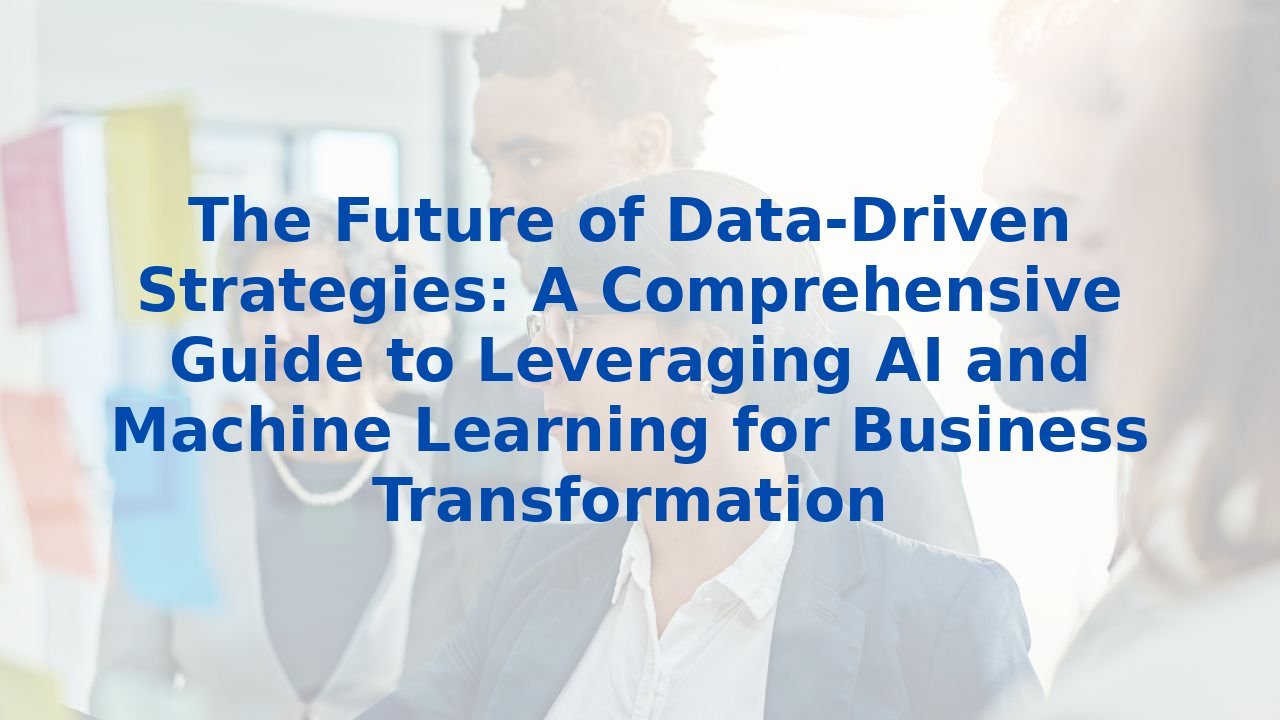The Future of Data-Driven Strategies: A Comprehensive Guide to Leveraging AI and Machine Learning for Business Transformation
The Future of Data-Driven Strategies: A Comprehensive Guide to Leveraging AI and Machine Learning for Business Transformation
Introduction
In an era defined by rapid technological advancement, the realm of data-driven strategies is evolving at a remarkable pace. Organizations that harness the capabilities of artificial intelligence (AI) and machine learning (ML) stand not just to survive but to thrive. These tools empower businesses to optimize decision-making processes, refine marketing strategies, and enhance operational efficiency. This guide explores the transformative power of AI in enhancing business processes while shedding light on the critical need for employee training to capitalize on these innovations.
The Rise of Data-Driven Decision Making
Data-driven decision making (DDDM) has emerged as a strategic approach that incorporates data analysis to dictate business actions. This modern methodology contrasts sharply with traditional methods that often depend on intuition or historical data. By leveraging cutting-edge technologies, businesses can manage and interpret complex data sets, leading to informed and impactful decisions.
The Role of AI in Data-Driven Decision Making
AI is integral to the fabric of DDDM, with the following key enhancements:
- Enhanced Data Processing: AI thrives on managing vast datasets at unprecedented speeds. This capability allows organizations to extract insights in real-time, a crucial advantage in competitive environments.
- Predictive Analytics: Leveraging historical data, AI algorithms forecast future trends, equipping businesses with insights to navigate market shifts and consumer behaviors robustly.
- Improved Decision Accuracy: By grounding decisions in data rather than intuition, AI minimizes bias, leading to increased reliability and accuracy in business operations.
- Personalized Insights: AI’s analytical power enables deep dives into customer behaviors, creating tailored strategies that catapult customer satisfaction and loyalty.
- Automation of Routine Tasks: The automation capabilities of AI expedite cumbersome tasks, liberating teams to invest their time in strategy and creativity.
Real-World Applications of AI in Business
Numerous industries have begun utilizing AI and ML for data-driven insights:
- Marketing and Advertising: Companies, such as Amazon, employ AI to analyze consumer behavior, optimizing product recommendations and enhancing user experiences. This foresighted approach translates to increased sales.
- Financial Industry: AI technologies streamline data analysis, providing financial institutions with quicker, more accurate insights, ultimately transforming decision-making processes.
- Healthcare: AI’s analytical prowess extends to healthcare by helping professionals unearth patterns in large datasets, enhancing diagnostics, and tailoring treatment plans to individual patient needs.
The Importance of Employee Training for AI
The integration of AI and ML technologies offers potent benefits, but their potential is best unlocked through comprehensive employee training. Here are some compelling reasons for investing in AI training programs:
- Enhanced Collaboration: Employees well-versed in AI can leverage it effectively, driving actionable insights and fostering collaboration between human intelligence and machine learning.
- Improved Data Interpretation: Training equips employees with the analytical skills necessary to understand AI-generated insights, enabling them to make data-informed decisions.
- Adaptability: A workforce trained in AI is better prepared to adapt to evolving technologies, allowing organizations to stay one step ahead in a dynamic business landscape.
- Reduced Bias: Knowledgeable team members can help identify and mitigate biases inherent in AI systems, promoting fairer and more equitable decision-making.
Conclusion
The interplay of AI and business processes signals a transformative shift in how organizations operate. Embracing these technologies allows companies to enhance decision accuracy, refine marketing strategies, and improve efficiency. However, the real advantage lies in investing alongside technology—empowering employees with the training needed to harness AI’s full potential. As we journey into an era driven by data, businesses must prioritize the dual commitment to technology and human capital, paving the way for sustainable growth and innovation.
References
For a deeper understanding of how to navigate this AI-driven landscape, consider exploring training solutions aimed at enhancing both organizational capacity and individual competence.



